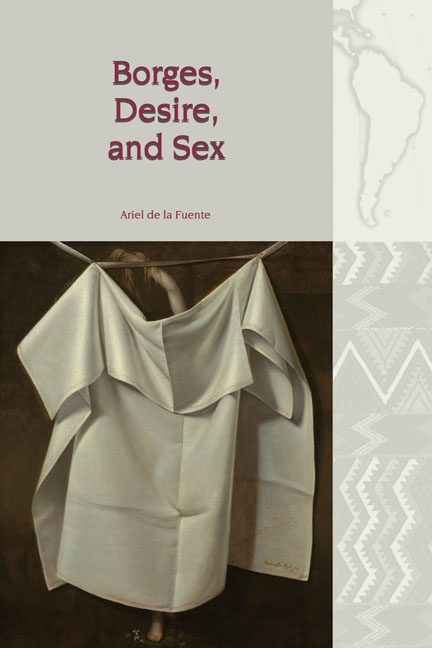Book contents
- Frontmatter
- Dedication
- Contents
- Acknowledgements
- List of Abbreviations
- Introduction
- 1 On Borges’s Sexuality
- 2 Biography in Literature and the Reading of Desire and Sex in Borges
- 3 Borges’s Erotic Library: The Poetry Shelf
- 4 Sir Richard Burton’s Orientalist Erotica: The Thousand Nights and a Night and The Perfumed Garden
- 5 Schopenhauer and Montaigne, Philosophy and Sex
- 6 Desire and Sex in Buenos Aires: Borges’s Poetry on the Arrabal
- 7 Stoicism and Borges’s Writing of Women
- 8 “Emma Zunz”: Sex, Virtue, and Punishment
- 9 “La intrusa”: Incest and Gay Readings
- Conclusions
- Works Cited
- Index
Conclusions
- Frontmatter
- Dedication
- Contents
- Acknowledgements
- List of Abbreviations
- Introduction
- 1 On Borges’s Sexuality
- 2 Biography in Literature and the Reading of Desire and Sex in Borges
- 3 Borges’s Erotic Library: The Poetry Shelf
- 4 Sir Richard Burton’s Orientalist Erotica: The Thousand Nights and a Night and The Perfumed Garden
- 5 Schopenhauer and Montaigne, Philosophy and Sex
- 6 Desire and Sex in Buenos Aires: Borges’s Poetry on the Arrabal
- 7 Stoicism and Borges’s Writing of Women
- 8 “Emma Zunz”: Sex, Virtue, and Punishment
- 9 “La intrusa”: Incest and Gay Readings
- Conclusions
- Works Cited
- Index
Summary
The point of departure for this book has been the extended, but in my opinion questionable, view among readers of Borges of an absence of desire and sex in his literature, a commonly accepted reading that, when assessed against the evidence contained in a significant portion of his the texts, I found unconvincing. Until now Borges has been largely considered an asexual author but in the preceding pages I have shown, I hope, that sexuality was a major preoccupation for him, both as a reader and as a writer.
I have read Borges biographically, as others have done before, but I have proposed a different relationship between his sexual biography and his literary experience. While the most common readings, perhaps unaware of the frequent invisibility of sexuality in his texts, have understood that there was a negative relationship between his literature and his sexual biography, that is, that because of the conflictive relationship with his own sexuality he could not read, think, or write about sex, in this book I show that Borges's sexuality was the point of departure for parts of his oeuvre and that he himself thought that his sexual impotence could be one of the legitimate interpretive key for his literature, as he believed was also the case for other authors such as Edgar Allan Poe or the Argentine poet Almafuerte.
Borges's sexuality was a preoccupation that guided part of his readings. I have shown that he was a curious and ardent reader of erotic literature, an aspect of his literary experience that, to the best of my knowledge, had not been systematically explored before. As we have seen Borges was interested, among others, in texts that recreated and reflected on the sex act and lived through their erotic imagination: while some of them got him sexually aroused others could help him make sense, for example, of his own visit to a brothel. But equally important, being the derivative writer par excellence of the twentieth century, the study of the erotic shelves of his library gave us the opportunity to look at the relationship between his sexuality and his own writings and see how some of his readings worked as technical models and sources for his own texts and, ultimately, shaped his oeuvre.
- Type
- Chapter
- Information
- Borges, Desire, and Sex , pp. 206 - 208Publisher: Liverpool University PressPrint publication year: 2018



